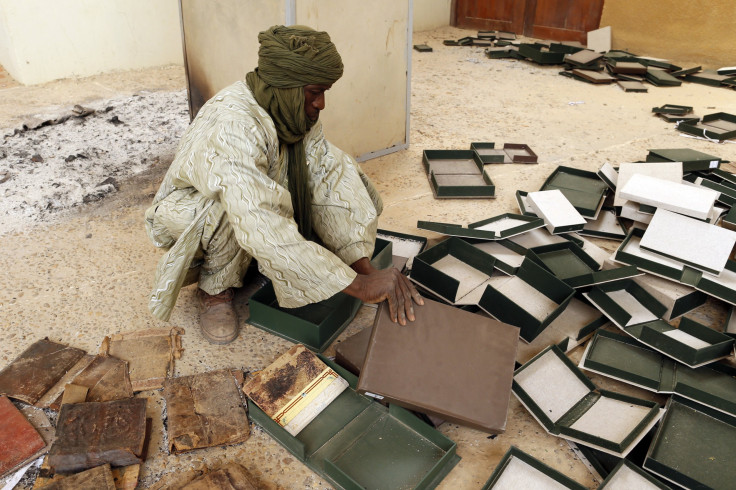The Ancient Manuscripts Of Timbuktu, Mali, May Be Safe After All

The costs of the crisis in northern Mali are mounting with every passing moment. Even as French, Malian and other African troops make significant gains against Islamist militants who have dominated the country’s northern region for a year, each day brings new stories of peace disrupted, families separated and lives lost.
Another tragedy occurred earlier this week as French and allied forces rolled into the ancient scholarly hub of Timbuktu: The fleeing insurgents set fire to a collection of manuscripts and artifacts in the library of the Ahmed Baba Institute, an air-conditioned building erected just three years ago to replace its crumbling predecessor.
Old papers may seem trivial when compared to the human cost of this ongoing conflict, but these documents were a testament to centuries of African scholarship and enterprise. The institute was a revered repository for some of the continent’s -- and the world’s -- most important historical records.
“Timbuktu was at the crossways of civilization many years ago,” says Joie Springer, a program specialist at the United Nations Educational, Scientific and Cultural Organization, or Unesco.
“There were trade records, mathematical documents, poetry, all sorts of different things recorded in those manuscripts, so it’s important from a historical point of view. But it’s also important because it helps to correct one of the most [egregious] mistakes about the past, which was that Africa had an oral heritage only; that there was no written heritage.”
In fact, Africa does have a tradition of written records, and the records at Timbuktu were proof of that. The insurgents’ wanton destruction was mourned by scholars and historians all over the world, but they can now take heart in a bit of good news: Vigilant civilians had reportedly taken pains to collect and hide some of the library’s most valuable relics months ago, saving them from the militants’ wrath.
That’s the story Vivienne Walt, a reporter with Time magazine, told during a Tuesday radio interview with PRI’S "The World."
“Most of my sources in Timbuktu have been telling me for months that they have hidden them away and although they [are] loathe to discuss this publicly and I vowed not to publish anything until Timbuktu had fallen, I really had been told for months that they were fairly safe,” she said.
“Last night [Monday], most of my sources told me that they had pulled out almost all of the documents from the Ahmed Baba Center, the major library in Timbuktu, and hidden them in a safe house elsewhere.”
It remains unclear exactly which -- or how many -- documents were saved. For safety reasons, the current locations of the relics have not been revealed, and Springer says Unesco has not yet confirmed reports of the documents’ safety.
“Once the situation has stabilized, the U.N. will send in a team of experts and professionals to have a better idea of exactly what happened, and then prepare a plan for the restitution of the heritage wherever possible,” Springer said.
She adds that Unesco has been developing a program to digitize artifacts in order to prevent the loss of information due to natural or manmade catastrophes -- and the reportedly saved documents of Timbuktu would make an ideal test case.
For the time being, scholars around the world will be watching the situation in Timbuktu as it unfolds, waiting until it becomes clear just how much damage the insurgents were able to do.
“Our hope, and the hope of the entire world, is that the manuscripts were indeed transferred somewhere safe,” says Springer. “That would be a great relief for all of us.”
© Copyright IBTimes 2024. All rights reserved.






















